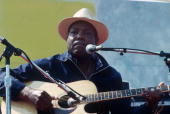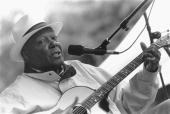
John Cephas
The singer and guitarist John Cephas, who has died aged 78, emerged on the blues scene in the mid-1970s. At that time many African-American musicians of his generation were uninterested in this music, particularly the old-fashioned acoustic blues, to which he was committed. His 32-year partnership with the younger harmonica player Phil Wiggins harked back to Brownie McGhee and Sonny Terry, who used the same instrumental tools to build an international following in the 1950s and 60s.
By the time Cephas and Wiggins appeared, however, McGhee and Terry were barely on speaking terms, even on stage, and the younger and more affable act inherited many of their fans. But despite their similarity to the earlier duo, “Bowling Green John and Harmonica Phil” were no clones
Cephas, in particular, promised to become a singer of considerable presence and individuality. That promise was steadily fulfilled in a series of albums over three decades, all collaborations with Wiggins – first for the German company L+R, later for the Chicago-based Flying Fish and Alligator labels – such as Dog Days of August (1987), which won a WC Handy award in the traditional category, the more elaborately produced Flip, Flop, & Fly (1992), and Homemade (1998). Their most recent album, Richmond Blues, was released in 2008.
Although he mainly finger-picked his guitar in the tradition of McGhee, Blind Boy Fuller and Reverend Gary Davis, Cephas frequently selected material in other regional styles or from other genres. His and Wiggins’s stage sets mixed familiar Virginia themes such as Red River Blues with songs from the Mississippian Skip James, while their albums’ guest musicians included jazz guitarist Tal Farlow, the Malian kora player Djimo Kouyate and a four-trombone “shout” band.

Cephas was born in Washington DC and grew up in Bowling Green, Virginia. He began playing guitar on an instrument given to him by his father, a minister. As a young man, he sang with a gospel quartet and played at house parties with his cousin David Talliaferro, but music was secondary to his job as a carpenter for the National Guard armoury in Washington. But in the mid-1970s, he began performing in public, first with the pianist Big Chief Ellis, until he died in 1977, then with Wiggins. In the 1980s he retired and took up music full time.
Personable and articulate, Cephas was ideally suited to the work most likely to be offered to a musician in his idiom, principally festivals, workshops and group tours with other “roots music” performers, sponsored by the Smithsonian Institution and the National Council for the Traditional Arts, of which he was a long-serving board member. “The NCTA was family to John,” says its chairman Joe Wilson. “He knew we helped create his career in music, and he never stopped trying to pay us back.”
 He and Wiggins also toured overseas, often for the US state department. They visited Britain with the American Folk Blues Festival in 1981, and the Soviet Union for the Smithsonian in 1988. They also participated in educational programmes and played in prisons and rehabilitation centres. “More than anything else,” Cephas said, “I would like to see a revival of country blues by more young people … more people going to concerts, learning to play the music. That’s why I stay in the field of traditional music. I don’t want it to die.”
He and Wiggins also toured overseas, often for the US state department. They visited Britain with the American Folk Blues Festival in 1981, and the Soviet Union for the Smithsonian in 1988. They also participated in educational programmes and played in prisons and rehabilitation centres. “More than anything else,” Cephas said, “I would like to see a revival of country blues by more young people … more people going to concerts, learning to play the music. That’s why I stay in the field of traditional music. I don’t want it to die.”
He was one of the founders of the DC Blues Society in 1987 and received a National Heritage Fellowship award in 1989. In February 2009, he was honoured by the state of Virginia as one of eight trailblazers designated by the Library of Virginia’s African-American history month.
Last November, he curtailed his travelling because of ill-health. He is survived by his companion Lynne Volpe, at least seven children and numerous grandchildren.
• John Cephas, blues singer and guitarist, born 4 September 1930; died 4 March 2009

 .
.